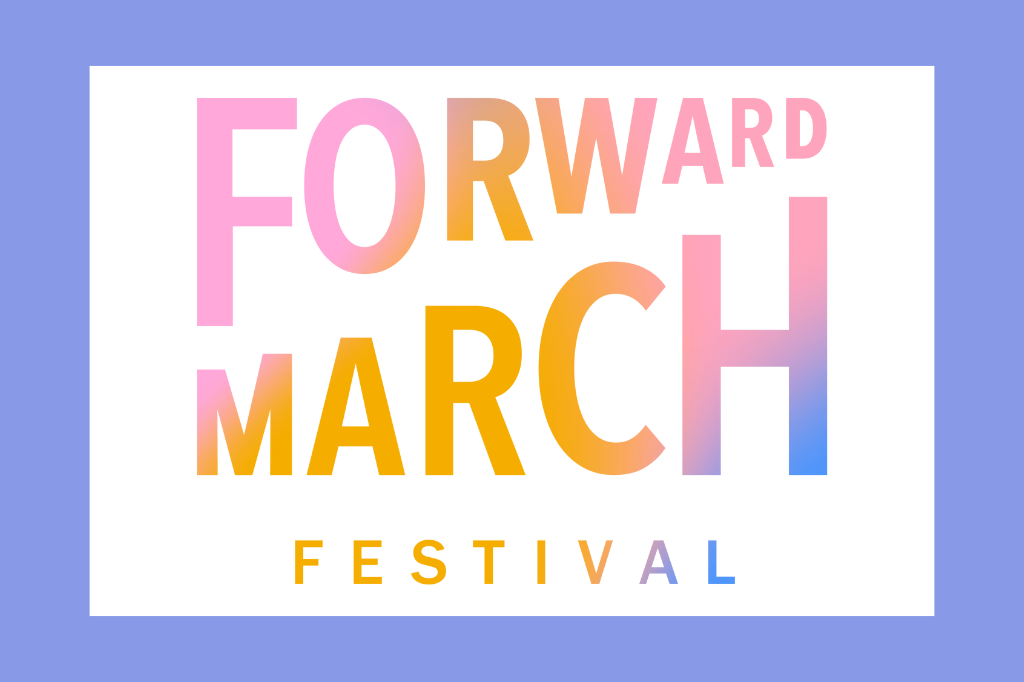REVIEW: How We Play(ed) and Benched at the Forward March Festival
March’s newfound weather gives way to outdoor theatre’s return but also spring’s rainy days. It can be bright, but a downpour could be around every corner. Theatre Direct usually takes full advantage of long, warm days as they bring their Forward March Festival to Earlscourt Park. As a theatre company for young audiences, they’ve brought in four emerging artist companies to try their hand with site-specific pieces catered to children.
But as an attendee on the March 25 showing, a consistent drizzle of rain made for a venue change. Audiences made their way to a Theatre Direct studio. Upon arriving, guests were invited to check in and wait in a “warming area.” Couches, chairs, and crafts galore scattered the room with folks from Theatre Direct and ASL interpreters seemingly everywhere to help out. Though it was dreary outside, the atmosphere indoors was simply radiant. The various theatre companies involved with the festival strove to make an audience’s experience no less wonderful than it might have been outdoors.
Soon enough, the audience was called to the studio. We entered into a world of opera with Opéra Queens Mike Fan, AKA drag diva Tanya Smania, and Christina Yun, dressed to the nines. Their voices were even more impressive than their outfits; this was an ingenious idea to kick off a festival. Although the singing quickly came to a close, the opera returned for transitions between shows.
There were four shows for every day of the festival, each 25 minutes long with a Q and A at the end. Folks could attend the first two shows, the last two shows, or all four. I caught the first two for the day — Live Others Theatre Collective’s How We Play(ed) and Fox Den Collective’s Benched.
How We Play (ed) is an intensely immersive audio play, directed by Lucy Rose Coren with guest director Lisa Marie DiLiberto, which gives kids the opportunity to enter a secret world with no adults allowed. Everyone is given their own set of headphones where they listen for instructions from seven young voices about games they’ll play , but it’s only the kids that participate. The voices we hear include Clara Dias Henriques Campelo, Giovanna de Paula Monteiro, Doruk Kolbasi, Cristina Marin, Stephanie Marin, Lucas Maciel V.N. Souza and Samuel Maciel V.N. Souza.
Given this show was meant to be outside with site-specific activities, Live Others Theatre Collective had only a few hours to reconfigure the activities to the studio space. They made us of the entire circumference of the studio as participants took giant steps and tiny steps, fast steps and slow steps. At one point, the story led the kids outside the studio to a covered outdoor area, where colourful mats were splayed across the ground — in the story, these were meant to be logs in the park, but Live Others Theatre Collective encouraged children to jump onto the foam tiles, while providing the narrative imagery of hopping from log to log. Upon re-entering the studio, there was a new set-up — an obstacle course creatively configured from chairs and stools.
In the play, while the seven voices take breaks from outlining instructions for the games, they tell stories about themselves — where they’re from, for instance, or their biggest fears. With audio clear as day and background music fitting for the adventurous style this show takes, it’s a fantastic way to engage young audiences while they learn about others’ cultures.
Next up was Benched, co-directed by Jessy Ardern and Sarah Feutl. This fully staged show is about two friends, Zoe (Carmen Osahor) and Charlie (Fatma Naguib), arguing over a miscommunication they had. In the play, Zoe didn’t go to Charlie’s “Games Night,” and the fight over it has been happening for way too long. So, clearly at a crossroads, Zoe and Charlie split the group of kids in the audience in half. They each take a team to opposite sides of the room, enlisting them to help sort out the disagreement.
As Osahor and Naguib describe memories and ask questions, they begin to write a note to their friend, with help from participants to express how they’re feeling. The actors in this production don’t take their roles lightly. They showcase their dismay at the broken friendship, and have the kids believe the weight behind their words. The storytelling stirs passion within the audience to storm the stage, chanting their team name and clapping for reconciliation.
Each of the shows creates a collaborative dynamic for children and a very inclusive environment. All shows are relaxed performances with ASL interpretation, or voiceover for ASL shows. Especially with the last-minute change from a site-specific outdoor festival to an in-studio configuration, all companies involved have shown a spirited commitment to their craft and community. Theatre Direct has put their best foot forward to captivate young audiences, and they can close this festival feeling accomplished.










Comments